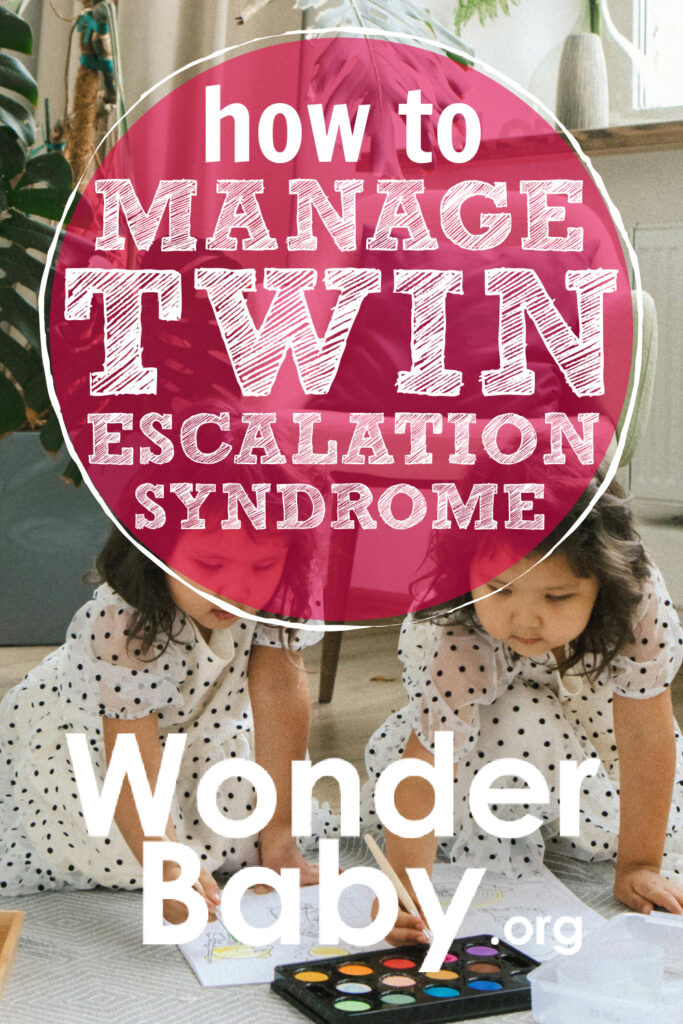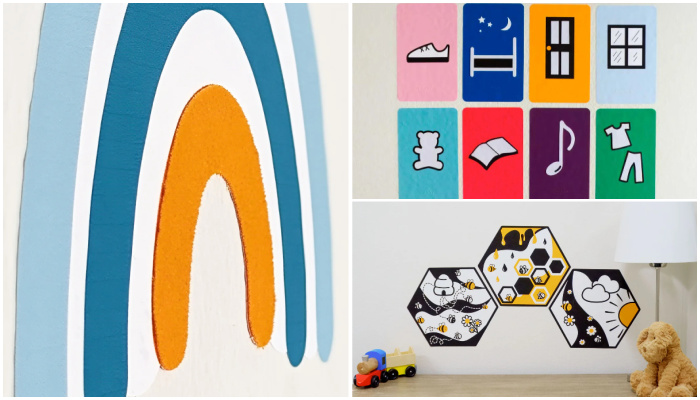How to Manage Twin Escalation Syndrome

- Twin escalation syndrome is an interesting phenomenon where twins escalate each other’s behavior.
- Several effective methods for managing twin escalation syndrome include creating individualized approaches, establishing effective communication, and implementing consistent routines.
- Prioritizing self-care and seeking professional support when needed can help you cope with difficult behavior.
I’ve always been fascinated by twins’ unique bond, but I’ve become enthralled with a whole new level of understanding of their relationship, so I’m eager to share more.
Twin escalation syndrome (TES) is when one twin starts a specific behavior, and the other begins the same behavior. For example, if one of your newborn twins starts crying, the other may chime in.
Unfortunately, the behavior can quickly spiral as each twin tries to outcry the other. (I think this is why headphones were invented.)
Why it happens is still up in the air, but several techniques for managing twin escalation syndrome exist. Remember, babies will cry, and tantrums will happen, but helping your little ones better handle specific situations will help everyone in the home.
Let’s look at some top ways to manage twin escalation syndrome!
1. Create an Individualized Approach

One of the best things you can do to manage twin escalation syndrome is to approach each child individually. It’s also best to encourage different activities, allowing each twin to develop their unique interests and skills.
You can also work on understanding each twin’s personality and needs, including how they handle and respond to different situations. As a twin parent, it’s important to remember they are two individuals and will have different triggers, likes, dislikes, etc.
In addition, if your twins get out of control, it’s okay to separate them until they calm down, especially if you offer them a private space to retreat when needed. Remember, separating your twins doesn’t mean they’re in trouble; it just gives everyone time to take a deep breath.
2. Establish Effective Communication

Another crucial method for managing twin escalation syndrome is establishing effective communication, especially as your twins grow older. Involving them in resolving conflicts can foster a sense of responsibility and teamwork.
Additional techniques to improve communication between your twins include:
- Spending individual time with each twin, which strengthens their sense of individuality and reduces competition for attention.
- Helping them develop skills to resolve conflicts independently and peacefully.
- Paying attention to situations that trigger TES and trying to mitigate them before they escalate.
- Showing how to resolve conflicts by modeling effective techniques, such as active listening and compromise.
- Refraining from comparing the twins to each other to prevent feelings of rivalry and resentment.
Establishing effective communication will also be vital in learning how to handle toddler meltdowns. Toddler meltdowns are rough moments, but learning how to communicate with your child in a crisis is a skill you’ll appreciate as they age.
3. Implement Consistent Routines

As a parent, consistent routines help make the world go round. Establishing a daily routine gives your twins a sense of security and predictability. In addition, when children know what’s expected of them, they’re more likely to behave accordingly. (Although I make no promises for perfect children!)
However, as parents, we know sticking to a routine can be challenging, so here are a few tips for implementing consistent routines:
- Create a realistic daily schedule that includes set times for meals, play, and rest.
- Give your child age-appropriate rules while phrasing them positively. (For example, say, “We walk inside,” instead of “Don’t run!”)
- Before transitioning to new activities, provide clear instructions and expectations to prepare the twins for what’s coming next.
- Reinforce positive behavior by recognizing your child’s efforts. (It doesn’t have to be elaborate or expensive!)
- Keep childcare providers and other family members as consistent as possible.
Research shows that children who live in consistent environments11. Bales, D. W.. Creating Consistency to Aid Brain Development in Babies. University of Georgia Extension. 2022. https://extension.uga.edu/publications/detail.html?number=C1053-11&title=creating-consistency-to-aid-brain-development-in-babies#:~:text=As%20children%20experience%20the%20same,of%20the%20world%20around%20them. learn to regulate their emotions and behavior better because they know what is expected of them. However, life is unpredictable, so it is best to avoid inflexibility or rigidity, which can increase stress and anxiety.
I know it’s tough to hear “Establish a routine” followed by “But don’t be too rigid!” At the end of the day, you want your twins to have an overview of a typical day but understand that life frequently gets in the way.
4. Set Clear Boundaries and Rules

Establishing clear boundaries and rules helps reduce conflict, promote positive behavior, and provide structure for both twins. When children know what’s expected of them, they learn over time that boundaries and rules exist for a reason.
Here’s an overview of how to successfully set clear boundaries and rules without having to pull your hair out:
- Apply consequences individually rather than collectively to avoid reinforcing that they are always treated as a single unit.
- Clearly outline which behaviors are acceptable and which are not, ensuring both twins understand these rules.
- Praise the twins when they follow the rules, using positive reinforcement, such as stickers, extra playtime, or verbal praise, to encourage good behavior.
- Teach your twins how to resolve conflicts peacefully, for example, using role-playing scenarios to help teach these skills.
5. Seek Professional Support

If you feel the situation is out of your control, seeking professional support is OK. Asking for help is a sign of strength.
You may benefit from speaking with a psychologist or family therapist experienced in twin and sibling dynamics. You can also attend parenting workshops or support groups to gain additional strategies and insights from professionals and other parents of twins.
A few popular support groups for parents of twins include:
You can also check Facebook, Reddit, or Meetup for local twin support groups. Remember, you’re not alone. Parenting is not easy, and sometimes you need to find your tribe. Self-care for parents of twins is also vital in keeping your sanity.
FAQs
What are the long-term effects of unmanaged twin escalation syndrome on twins?
TES can have several long-term effects on twins, potentially impacting their relationships, individual development, and interactions.
Examples of potential long-term effects include:
- Impact on self-esteem and identity
- Strained sibling relationship
- Behavioral and emotional issues
- Parent-child relationship strain
Fostering individuality, promoting positive interactions, supporting emotional well-being, and maintaining fairness can help ensure your twins develop healthy, supportive relationships and a strong sense of self.
Can twin escalation syndrome be cured entirely, or is it only manageable?
Twin escalation syndrome is a natural part of the twin relationship, and it cannot be “cured” in the traditional sense. However, it can be effectively managed with the right strategies and techniques, allowing for a more harmonious and positive twin relationship.
In addition, as twins grow and develop, their relationship dynamics and behaviors will naturally evolve. What might be a significant issue in early childhood could become less prominent as they mature and develop individual social identities.
What are the earliest signs of twin escalation syndrome in toddlers?
While all children are different, common behavioral signs of twin escalation syndrome in toddlers include:
- Increased competition for attention
- Heightened emotional responses
- Escalating conflicts
- Mimicking negative behavior
- Difficulty taking turns and sharing
How does twin escalation syndrome differ between identical and fraternal twins?
Due to genetic, developmental, and environmental factors, twin escalation syndrome can manifest differently in identical and fraternal twins. For example, identical twins share nearly 100% of their genes and frequently have similar behavior traits.
On the other hand, fraternal twins may experience fewer comparisons, allowing them to develop more independent identities.
References
- Bales, D. W. (2022, December 16). Creating Consistency to Aid Brain Development in Babies. University of Georgia Extension. https://extension.uga.edu/publications/detail.html?number=C1053-11&title=creating-consistency-to-aid-brain-development-in-babies#:~:text=As%20children%20experience%20the%20same,of%20the%20world%20around%20them.

Related Posts

Parenting
Sensory Wall Art: 5 Tips to Create a Room Your Blind or Low-Vision Child Will Love
Even if your child can’t see their surroundings, personalizing and decorating their room with thoughtful, sensory-friendly design can make a big difference in their confidence, independence, and joy.

Parenting
4 Tips to Manage Twins Alone as a Single Parent
Taking care of twins alone as a single parent can feel overwhelming. Learn practical ways to help lighten the load.

Parenting
5 Self-Care Tips for Parents of Twins
Raising twins has its own set of stresses and demands—and joys! Make sure you’re taking care of you with these self-care tips for parents of twins.